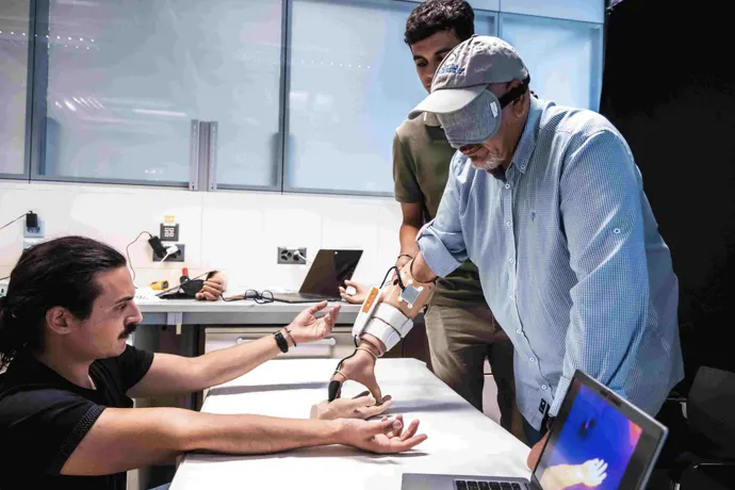
February 09, 2024
 EPFL/Caillet
EPFL/Caillet
Fabrizio, an Italian man who lost his hand, does a blindfolded experiment with a prosthetic device that enables him to 'feel' temperature using an artificial limb.
Researchers in Europe have developed a prosthetic hand that gave an Italian man with a missing limb the ability to feel sensations of warmth and coolness when touching various objects. The new device could pave the way toward enabling people with amputations to have realistic "phantom sensations," helping them feel more connected to their environments and other people.
The technology was tested in series of experiments that measured whether thermal feedback could be relayed in real-time from a sensor on the fingertip to a residual part of the limb, where the prosthetic device is able to adjust temperature based on the object being touched.
"Temperature is one of the last frontiers to restoring sensation to robotic hands," said Silvestro Micera, a senior researcher for the study, published in the journal Med. "For the first time, we're really close to restoring the full palette of sensations to amputees."
The battery-powered prosthetic device, called MiniTouch, was tested on a 57-year-old man named Fabrizio, whose right arm was removed below his elbow when he was 20 years old. The sensor was designed to detect temperatures in a range between 68 to 104 degrees. The goal was to create phantom perceptions in Fabrizio's central nervous system, making his brain interpret the temperature changes as if they were happing in his missing hand.
In one experiment, Fabrizio was asked to differentiate between identical bottles of water at different temperatures. When he used the device, Fabrizio was able to correctly gauge whether the water was hot, cold or room-temperature with 100% accuracy. Without the device, Fabrizio was only correct 33% of the time.
Another experiment asked Fabrizio to use the device to distinguish between slabs of copper, glass and plastic while he was blindfolded. This time, he was tested with both the MiniTouch and with his other hand. When the device was on, Fabrizio's accuracy with the prosthetic hand was equal to his other hand. But when the device was off, his responses were no better than guesses.
Fabrizio also was able to use the device to tell the different between a real arm and another prosthetic arm when he was blindfolded. He was 80% accurate when the device was turned on compared to 60% accuracy when it was disabled.
The study was a collaboration between the Sant'Anna School of Advanced Studies in Italy and the École Polytechnique Fédérale de Lausanne in Switzerland. The researchers believe the device can be used in wide range of prosthetic limbs.
"This is a very simple idea that can be easily integrated into commercial prostheses," Micera said.
The researchers hope to expand on the wearable technology by incorporating sensors for other sensations like wetness, pressure, position and texture, all in one device.
Although the results of the experiments are promising, one sensory feedback expert suggested the findings are still too limited to expect the technology to be used in health care settings in the near future. University College Dublin engineer Sigrid Dupan, who wasn't involved in the study, told the Guardian that the MiniTouch researchers previously found inconsistent results with attempts to produce phantom sensations in other people with amputations. It's possible some people may not have as much success with the device.
The researchers plan to test the MiniTouch device in a larger group of people with amputations to get a better grasp of its functionality. They then hope to build out technology for the additional senses that could be included in their device.
"This study paves the way for more natural hand prostheses that restore a full range of sensations, offering people with amputations a richer and more natural perception of the tactile world," Micera said.